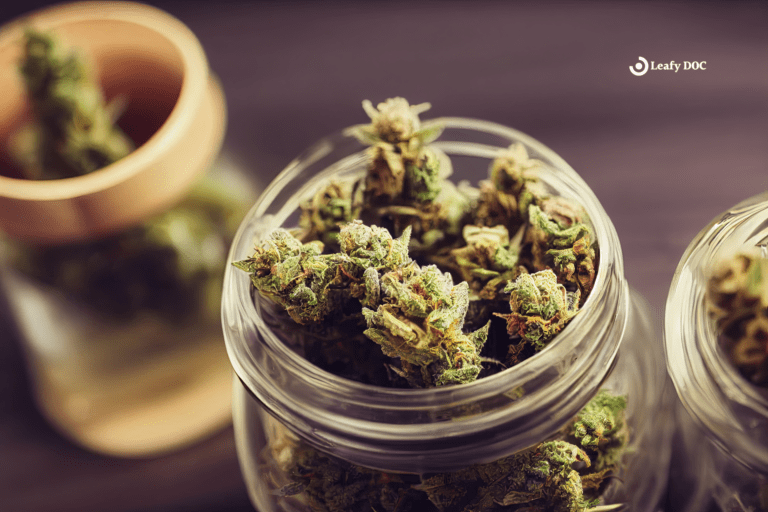Asthma
Can medical cannabis help treat asthma, or will it worsen the condition? Let’s find out below.
What is asthma?
Asthma is a chronic lung disease that affects the airway tubes that transport air in and out of the lungs. With asthma, the airways can become inflamed and narrowed, which typically causes coughing, wheezing, and chest tightness. Healthcare professionals call these symptoms asthma attacks or flare-ups when these symptoms worsen.
What are the symptoms?
The symptoms of asthma typically range from mild to severe and may include the following:
- Chest tightness
- Bouts of Coughing
- Shortness of breath
- Wheezing
These things can happen during an asthma attack:
- Bronchospasm: The muscles around the airways tighten, and air cannot flow freely through the constricted airways.
- Inflammation: The lining of the airways becomes swollen, which blocks air from getting in and out of the lungs.
- Mucus production: The body creates thick mucus that can clog the airways.
What Causes Asthma?
Genetics and environmental factors likely influence the development of asthma; however, the exact cause is unknown.
An asthma attack may occur when exposed to an asthma trigger, which can worsen your asthma symptoms. Various stimuli can cause different types of asthma, including:
- Allergens are substances that cause an allergic reaction. They include:
- Dust mites
- Mold
- Pet dander and hair
- Pollen
- Pest waste
- Non-allergic asthma is caused by triggers such as:
- Cold air
- Certain medications
- Cleaning products and chemicals
- Virus or Infections
- Air pollution
- Tobacco smoke
Who’s at risk for Asthma?
Asthma affects people of all ages but often occurs in childhood. Certain factors can increase the risk of having asthma:
- Exposure to secondhand smoke, especially as a young child
- Exposure to chemical irritants or industrial dust at work
- Genetics and family history.
- Race or ethnicity.
- Having other diseases or conditions
- Viral respiratory infections as a child.
- Sex; asthma is more common in young boys and teen girls.
Types of Asthma
Asthma is categorized into types based on the cause and severity of the symptoms.
- Intermittent: This type of asthma comes and goes so that you can feel normal in between asthma flares.
- Persistent: Persistent asthma means you have symptoms much of the time. Symptoms can be mild, moderate, or severe, depending on how often you have them.
- Allergic: Allergens such as molds, pollens, and pet dander can cause an attack.
- Non-allergic: Outside factors such as exercise, stress, weather, or illness can cause an asthma flare-up.
- Adult-onset: This asthma type starts after the age of eighteen.
- Pediatric: This asthma type begins before age five and can occur in infants and toddlers. It is often outgrown with time.
- Exercise-induced asthma: This type of asthma is triggered by exercise.
- Occupational asthma: This type typically affects people who work around irritating substances.
- Asthma-COPD overlap syndrome (ACOS) occurs when a patient has asthma and chronic obstructive pulmonary disease (COPD).
Diagnosing & Treating Asthma
How is asthma diagnosed?
- Physical exam
- Medical history
- Lung function tests
- Airways Reaction Test
- Peak expiratory flow (PEF) test
- Fractional exhaled nitric oxide (FeNO) test
- Allergy Skin or blood tests if you have a family history
Your doctor will work with you to customize a treatment plan if you receive an asthma diagnosis. The program will typically include ways to manage and prevent asthma symptoms and attacks.
- Trigger Avoidant Strategies. If tobacco smoke triggers you, try not to be around people smoking. If a pet dander triggers you, make sure and regularly sweep and vacuum with a pet in the house.
- Quick-relief medications to prevent and relieve symptoms during an asthma attack. They include an inhaler or other medicines that work quickly to help open your airways.
- Long-term Control Drugs are taken daily and help reduce airway inflammation and prevent airway narrowing.
Can smoking weed make Asthma worse?
Many people with asthma smoke or vape cannabis, which could harm the lungs and airways, especially in younger people. In a recent PEACE survey, around 53 percent of cannabis users with asthma smoked, while approximately 35 percent vaped. About half of the reported cannabis smokers with asthma had uncontrolled asthma symptoms.
It isn’t recommended that people with asthma smoke or vape cannabis because it can increase cough, wheezing, shortness of breath, and even an asthma attack or flare-up. However, there may be potential therapeutic benefits for asthma using other consumption methods such as edibles, tinctures, and topicals.
These routes of administration may be safer since they don’t harm the lungs the way inhaled consumption does. Asthma patients who are exposed to secondhand cannabis smoke could suffer from an allergic reaction as well.
Dangers of Weed Mold for Asthma Patients
While smoking moldy weed may not kill you, it is still not recommended and could have potential adverse effects, especially for those with certain chronic respiratory conditions such as asthma.
If you consume moldy weed and are allergic, you could potentially experience the following mild effects:
- coughing
- nausea and vomiting
You could also end up with inflammation of your sinuses and lungs, with more severe symptoms like:
- sinus pain
- drainage
- congestion
- wheezing
- chest pain
Inhaling certain mold species can have severe health consequences for those with weakened immune systems, lung conditions, and asthma. Some molds like Aspergillus, Mucor, and Cryptococcus can cause severe infections in the lungs, central nervous system, and brain for people with a medical condition related to the immune system.
Can Medical marijuana treat asthma?
Recent evidence suggests certain cannabinoids may help with asthma symptoms such as inflammation, pain, and anxiety.
Airway remodeling is a chronic structural change caused by asthma that causes harmful changes to the airway structure, possibly leading to blockages and loss of lung function. A 2019 study evaluated cannabidiol’s effects on airway remodeling by activating and changing CB1 and CB2 receptors within the central nervous system and immune cells. Researchers found that they could potentially reduce airway inflammation by activating these two cannabinoid receptors.
A 2020 study published in the Israel Medical Association Journal reports case studies of three asthmatic patients who showed improvement with non-inhaled medical cannabis. The review supports that CB1 and CB2 receptors in lung immune cells can help reduce airway inflammation.
Now that medical marijuana has become legal in 3/4 of U.S. states, more time and further research will conclude if medical cannabis can help relieve asthma symptoms, giving those who suffer from the symptoms more hope for the future.
Last Updated: June 14, 2024
Get Your Medical Card
Connect with a licensed physician online in minutes
Table of Contents
Keep Reading
-
Understanding Cannabis Strain Genetics: Indica vs. Sativa vs. Hybrid
Explore the differences between indica, sativa, and hybrid cannabis strains and how they can be used for treatment. Learn about the unique properties of each strain and their effects on the body.
-
Revitalizing Your Skin With CBD For Wellness
Transform your skincare routine with CBD for wellness benefits. Revitalize your skin and experience the amazing CBD skincare benefits today!
-
Can You Mix Cannabis And Amoxicillin
Unveiling the Truth: Mixing Cannabis and Amoxicillin – Learn about the risks and benefits of combining these two substances. Don’t miss out on this eye-opening article! Click now to find out more.



